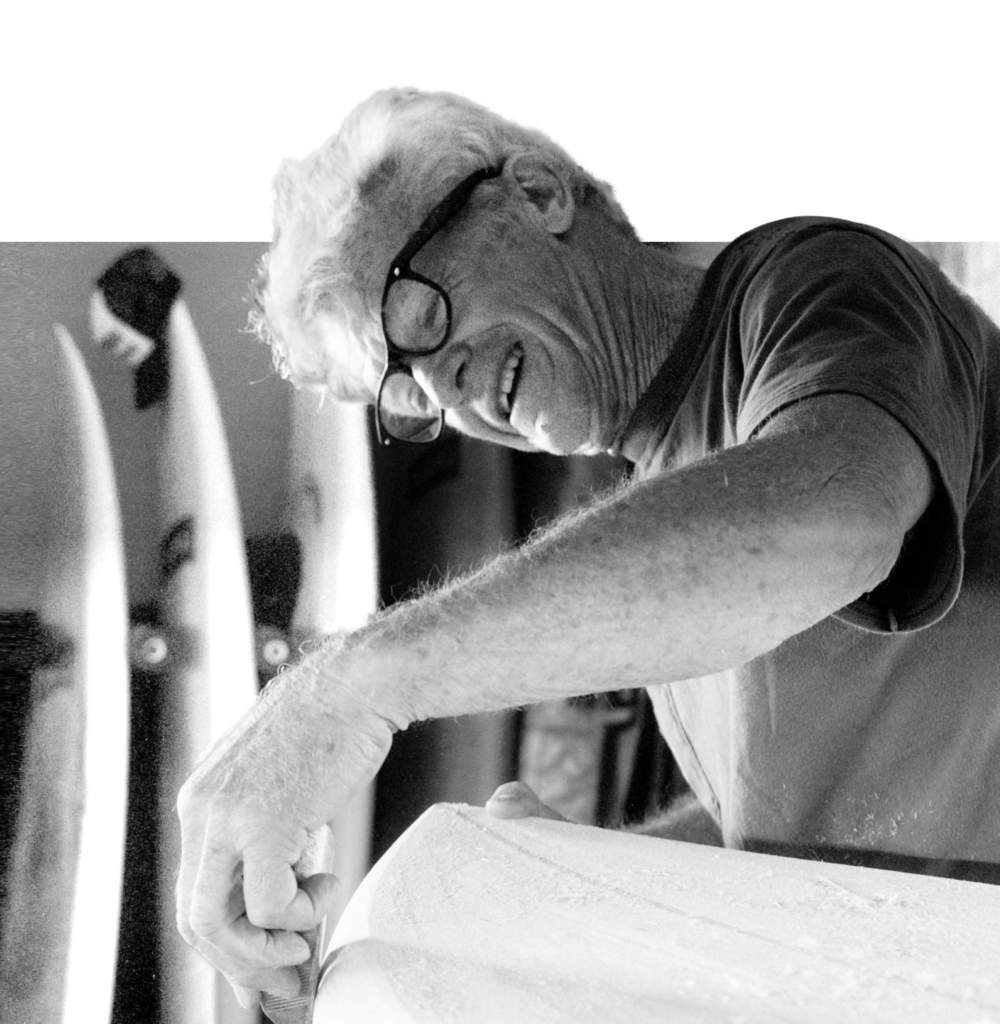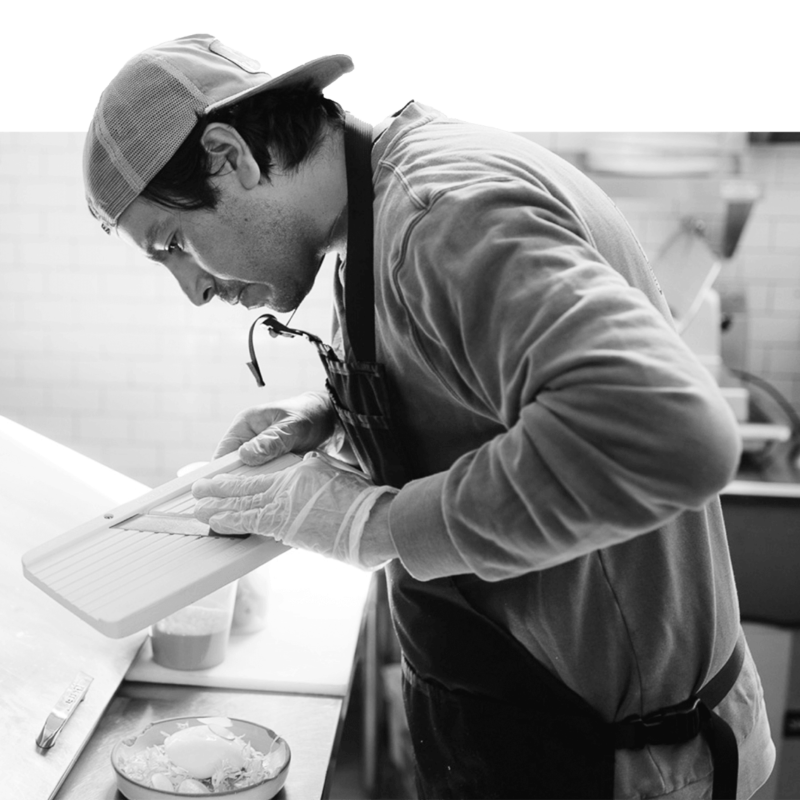On the internet you are never alone, and because of that at Mozilla we know that we can’t work to build a better internet alone. We believe in and rely on our community — from our volunteers, to our staff, to our users and even the parent’s of our staff (who also happen to be some of our power users). For Father’s Day, Mozilla’s Natalie Linden sat down with her father, big wave surf legend and surfboard maker, Gary Linden to talk the ocean, the internet and where humanity goes from here.
We should probably start by telling people who we are. I am Natalie Linden, the Director of the Creative Studio in Mozilla marketing.
And I’m Gary Linden. I’m your father. That’s probably my best accomplishment.
Awww Dad.
I make surfboards, run surfing events and surf. I’m semi-retired. Sort of.
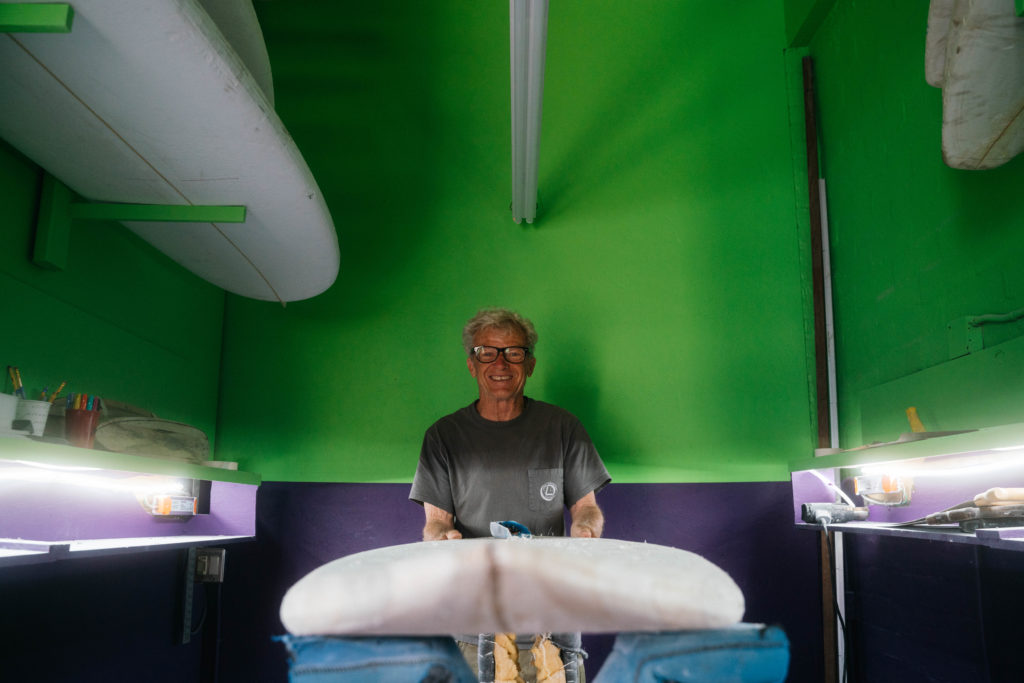
I don’t think you’re giving yourself enough credit. When I tell people I’m Gary Linden’s daughter, they always say “Gary Linden?! He’s a legend!”
You know, if you’re involved in something for all your life, and you do a reasonably good job, you’ll get old and then you’ll be the oldest one around. So of course you’ll be the legend!
One of the things you’re the oldest guy doing is paddling into really, really big waves.
Yeah I’m a big wave surfer, that’s been my passion. I wasn’t afraid of the ocean or of big waves, and that set me apart from most other surfers. So I got admission to a club that was pretty exclusive. And that was pretty cool. Then I started the Big Wave World Tour so younger surfers could have a career path to becoming a big wave rider. Big wave surfing takes more time and resources: you have to have the means to travel, the boards are more expensive. We weren’t seeing the younger people really be able to surf the big waves so we weren’t seeing what could be done in the peak athletic performance years. I’m pretty proud of that tour.
One of the questions I was going to ask you is why you do what you do, and I think you’re starting to answer that. The way you’ve always described it to me is that from the first time you rode a wave on a surfboard, you knew that’s what you wanted to do, and you’ve oriented your whole life around being able to surf as much as possible.
Yes. Even before I rode a surfboard, my father took me to the ocean and taught me to play in the waves, and about the currents, and body surfing. The freedom of it was like nothing else. I had asthma and hay fever, and when I was in the ocean I didn’t feel any of that. Whereas on land the pollens and the dryness just made being on the land kind of miserable. Like a fish out of water in a lot of ways. It was always rewarding for me to go into the ocean. It goes beyond just feeling good. It’s a state of mind as well.
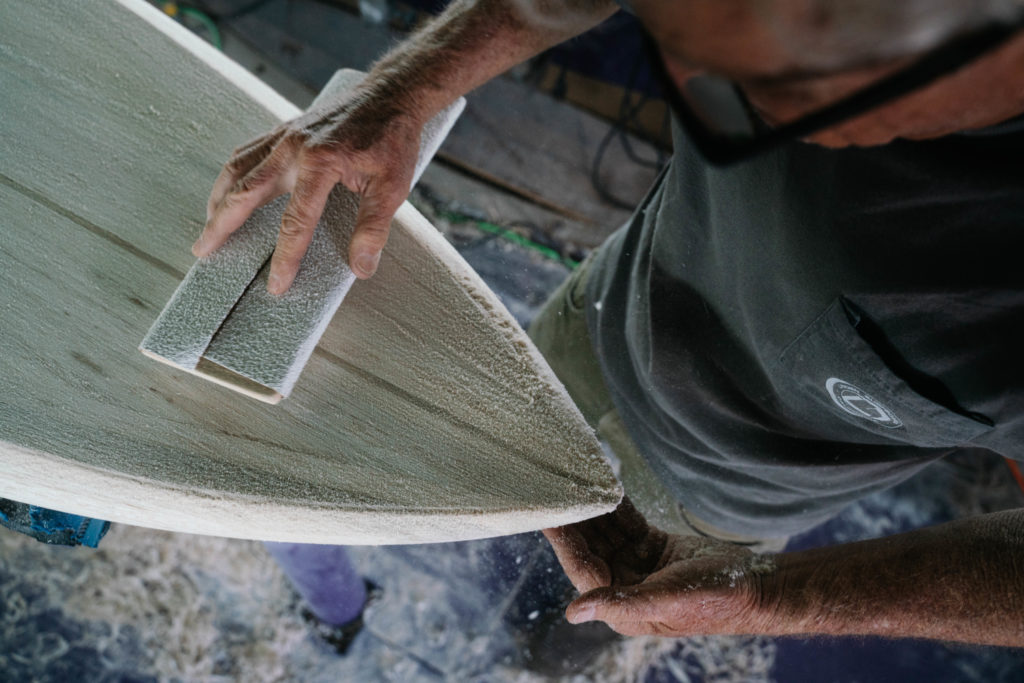
So you started making surfboards, too.
I started making surfboards because surfing went into a transitional period — we all had longboards and then in the 70s, some of the Australians started experimenting with boards that were a foot shorter. There was nobody in San Diego making them, so I got a blank and shaped a board. And then I started making them for my friends, and it just set me on a path. But I’ve always made surfboards so that I could have the boards I needed to surf. If somebody else wanted one, that was fine, but I wasn’t making it for them. I was making it for me. Because surfing — not surfboard making — was my primary focus.
How has the internet changed what you do?
Well first, the internet has made it incredibly easy to find out where the best waves of the day are. There are cameras all over the world now and you get surf reports. You don’t have to drive to the beach — you can live inland and plan ahead. And this year with the pandemic, live surfing competition was pretty much shut down. So a friend and I created a virtual surfing world tour called Surf Web Series, where we could take video clips of surfers who had gone out the prior year, take a little video of their best waves and then we’d put those in heats just like a regular event and judge them and take it all the way to a final like a surfing competition. That was a lot of fun because it filled the gaps for a lot of the kids who are surfing professionally but they couldn’t give anything back to their sponsors during the pandemic because they weren’t competing, they didn’t have a way to get exposure, they didn’t have a way to further their career. This gave them an opportunity to keep going in their career, and keep the world interested in the sport of surfing. It’s opened up another avenue for the sport.
I just focus on being in the best shape I possibly can, so I can surf. And I’m going to do it as long as I can. And when I can’t stand up anymore, I’ll be on a belly board. And when I can’t do that, I’ll jump in the waves.
One of the things I really admire about you, dad, is that you never stop having ideas. You set this intention of surfing for your life, and you keep finding new ways at it. You’re 71 and you’re still growing, you’re still changing, you’re still figuring out how to use the latest tools and culture to do the thing you set out to do. It inspires me every single day. It also helps that I see it up close, because we share an office!
Well you inspire me too, because of your energy and motivation. I don’t think you’re ever going to stop either, because you are inspired, you are motivated. That’s what surfing was for me: it gave me something to focus on 100%. I love it so much, and it’s so good for me, that I don’t go snowboarding, I don’t skateboard, I don’t play football, I don’t ride bicycles. I don’t want to get hurt doing anything else. I don’t drink, or stay out at night. I just focus on being in the best shape I possibly can, so I can surf. And I’m going to do it as long as I can. And when I can’t stand up anymore, I’ll be on a belly board. And when I can’t do that, I’ll jump in the waves. I don’t really care. I just like that original feeling of going in the ocean with my dad and feeling clean and involved with the earth. My connection with the earth is the ocean.
Speaking of staying in shape, how has your relationship with the internet changed since the pandemic?
You know the answer to this one, since we share a yoga room at our office. I started yoga about three years ago now because I wanted to be in better shape for surfing. I didn’t want to go at first because everyone was so young and as a beginner, it was intimidating. I couldn’t really keep up and felt awkward. But I found a geriatric yoga class, and it was really fun. I was getting better. Then with the pandemic, they started a zoom class. And now it’s actually even better. Because for older people, it’s still really intimidating. Now we can focus on the teacher and not feel self-conscious. It’s pretty awesome. Now you can do your work on the internet too — all the meetings and stuff. I mean, sometimes I wish the internet wasn’t there because you have to focus a lot more to stay grounded on the earth. Otherwise you’re just in that cloud. And that’s a really all-consuming place to be. I don’t think we were really made for that. So it’s another area where you have to find your balance. But you gotta find your balance in everything anyway. Even pigeon pose!
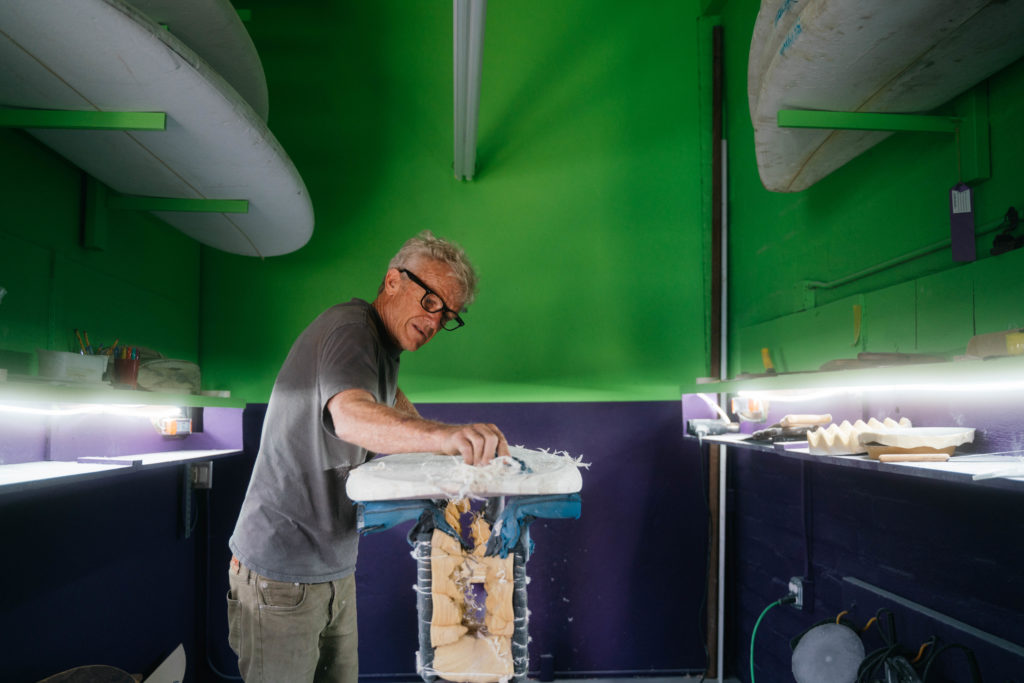
Is there something about technology that blows your mind?
Yeah, it doesn’t ever stop. It’s like watching science fiction happen in real life. It goes so fast. I’m fortunate enough that I was born before television, so I’ve seen a lot of stuff change. It’s so rapid. If you go back in history and think about evolution, it took so long for us not to be covered in hair, and to be able to talk, and now we’re talking about having chips in our bodies to help us heal, and artificial intelligence. If you dwell on it, it’s really overwhelming for someone my age. It can be scary. But there’s a lot of positive to it, so you’ve gotta stay on that side.
Speaking of positivity, what’s your favorite fun stuff to do online?
I like Facebook and Instagram because I get to have some kind of contact with people all over the world. I’ve got friends everywhere from my life of traveling, and when I post something, the person who comments could be someone I haven’t talked to for 50 years! I like going on Surfline to see the surf report. And I like to write and receive emails. Because it used to be such a lag! I used to write letters to my friends, and it would be a month between receipt. And you’d change in that month. But with email, you can keep the conversation going without interruption.
…it took so long for us not to be covered in hair, and to be able to talk, and now we’re talking about having chips in our bodies to help us heal, and artificial intelligence. If you dwell on it, it’s really overwhelming for someone my age. It can be scary. But there’s a lot of positive to it, so you’ve gotta stay on that side.
What’s your hope for how technology can change or improve the future? What do you want [your grandson] Nimo to be able to do?
I would like my grandson to be able to use the internet to feed and shelter the world. I don’t know how it’ll work, but you can already see… GoFundMe has helped the lives of a lot of my friends who got to my age or older, and just didn’t put anything away. Everybody throws a hundred bucks in, and all the sudden the guy’s at least got a chance to make it to hospice. That’s the kind of thing I hope we can do, that the communication will help us realize that it’s not just one person or one country versus another. It’s our world, and we have to all live together. I hope we get to the point that we see it’s a global economy, a global outcome. That we have to live as humans and not Americans or Chinese or Russians. I just think being able to communicate and see that we’re all the same, we all have the same needs. Food, shelter, companionship. If you get all that, you don’t really need anything else.
That’s exactly why I work at Mozilla: I believe our collective future will be decided on the internet. So we need to make sure it’s a place that can breed a positive outcome.
That’s right. And that’s the scary part we saw in the last election. All the junk that was online! So many lies! We didn’t know what was true, and what wasn’t true, and we had to decide for ourselves. We had to create our own filters. We had to choose the truth we wanted, the one that reflected the future of the world we want.
You’re my hero, Dad. Happy Father’s Day.
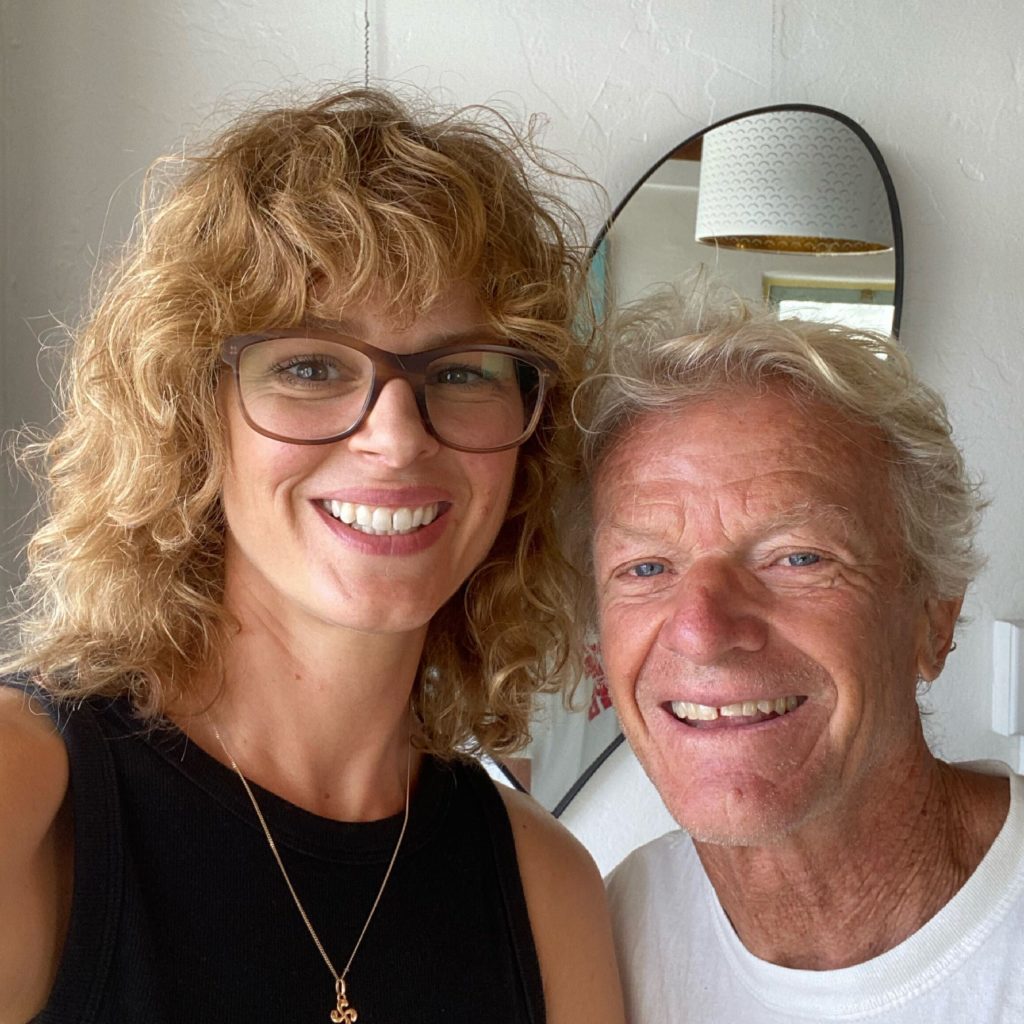
Natalie Linden and her dad,
Gary Linden
